The Electronic Intifada 3 February 2017
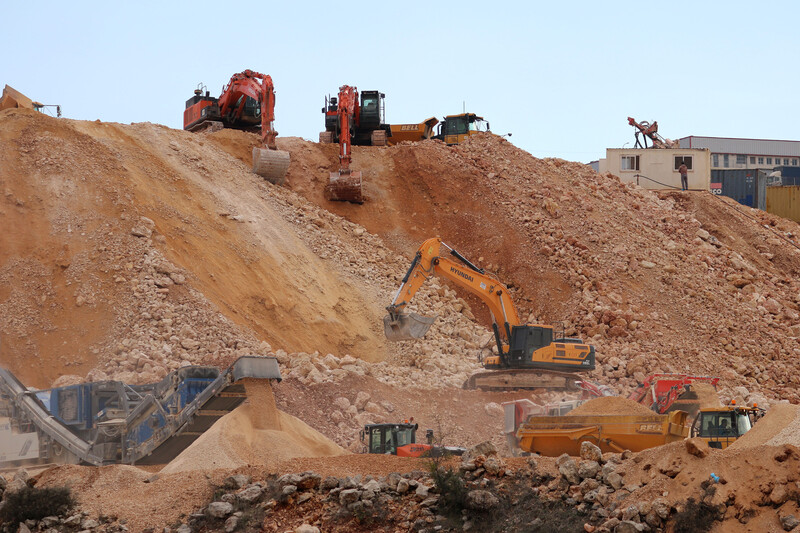
Expansion work inside the Israeli settlement of Ariel, near the West Bank town of Salfit, on 2 January, days after the adoption of UN Security Council Resolution 2334, demanding the halt of Israeli settlement activity on occupied Palestinian territory.
ActiveStillsIn Palestine, the new year got off to a violent start.
On 8 January, Fadi Ahmad Hamdan al-Qunbar, 28, plowed his truck into a group of Israeli soldiers in Jerusalem, killing four before he was shot dead. Israel plans to revoke the Jerusalem residency of al-Qunbar’s relatives and issued orders to demolish their home.
Two Palestinian men, Muhammad al-Salahi, 32, and Muhammad Abu Khalifa, 19, were killed during army raids in the occupied West Bank during the month.
Qusay al-Amour, 17, was the first Palestinian child killed by Israeli forces this year. He was shot dead while hiding from soldiers in a grove in Tuqu village near the West Bank city of Bethlehem. Soldiers were shown on video dragging the boy dozens of meters, his head repeatedly hitting the ground, after he had been shot.
Soldiers were seen on video shooting and killing Nidal Daoud Mahdawi, 44, at a checkpoint near the West Bank town of Tulkarem. The army claimed he was attempting to attack soldiers. Hussein Salem Abu Ghosh, 24, was slain during the course of an alleged car ramming attack near a Ramallah-area settlement in the West Bank. No Israelis were injured during either incident.
Deadly raid on Bedouin village
Yaqoub Abu al-Qiyan, 50, was shot and killed during a home demolition raid in Umm al-Hiran, a Palestinian Bedouin village in southern Israel that the state aims to evacuate and replace with a Jewish settlement named Hiran.
Police claimed that Abu al-Qiyan was attempting to ram police with his car, but video from the scene bolsters eyewitness claims that Abu al-Qiyan was not attempting any attack, and lost control of his vehicle and ran into police only after he was shot. A police officer was killed during the incident; eyewitness testimony suggests the officer may have been killed by police fire.
A Palestinian citizen of Israel was charged with murder in the 3 January shooting death of an Israeli driver and the attempted murder of a rabbinical conversion judge. “According to the indictment, Muhammad Shinawi, 21, acted out of political and religious motives,” the Tel Aviv daily Haaretz reported.
Gaza under siege
Muhammad al-Hissi, a 33-year-old fisherman in Gaza, went missing on 4 January after his boat was sunk by the Israeli navy. His body has not been recovered and he is presumed dead.
Ahmad Hassan Shubeir, 17, died on 14 January after Israel denied him permission to leave Gaza for treatment for a congenital heart defect. “He was denied permission to access [a] hospital after he refused to serve as a collaborator for the Israeli authorities, a coercive measure regularly employed on Palestinian patients in need of permits,” Al-Mezan, a human rights group in Gaza, stated.
Also in January, Muhammad Swairki, a newborn in Gaza, froze to death “as he slept in a trailer temporarily sheltering his family after their home was destroyed during Israel’s 2014 offensive,” according to Defense for Children International - Palestine.
A fighter with Hamas’ Qassam Brigades, Issam al-Agha, 22, died in a tunnel collapse in the southern Gaza Strip on 20 January. The Qassam Brigades stated that 22 of its fighters had died during the previous year.
Leanne Zahir Nasser, 18, a Palestinian citizen of Israel, was among the 39 victims of a shooting massacre at a New Year’s Eve party at an Istanbul nightclub.
The Action Group for Palestinians of Syria recorded seven Palestinian deaths in January as a result of the ongoing war there. Four of those killed were fighters in militias allied with the Syrian government.
Rafah crossing
Rafah crossing – the sole point of exit and entry for the vast majority of Gaza’s 2 million residents – was exceptionally opened for travel in both directions for four days at the end of January. The crossing had been closed for 38 consecutive days before the four-day opening. Rafah was partially opened for only 44 days in 2016.
The Palestinian border committee stated that two travelers died of “natural causes” at Rafah on 30 January.
Meanwhile, Palestinians in Gaza endured the winter cold with as few as three hours of electricity per day as the chronic electricity crisis there sharply deteriorated, with the Hamas authorities in Gaza pointing blame at the Fatah-run Palestinian Authority in the West Bank, and vice versa.
Israeli forces razed or seized dozens of Palestinian-owned structures in the West Bank on the pretext that they were built without permits, according to the United Nations monitoring group OCHA. Also demolished were 11 homes in Qalansawa, a Palestinian town in Israel, and 15 were destroyed in the Bedouin village of Umm al-Hiran.

A Palestinian woman examines her home in the Balata refugee camp in the northern West Bank after it was raided by Israeli soldiers overnight, 3 January.
ActiveStills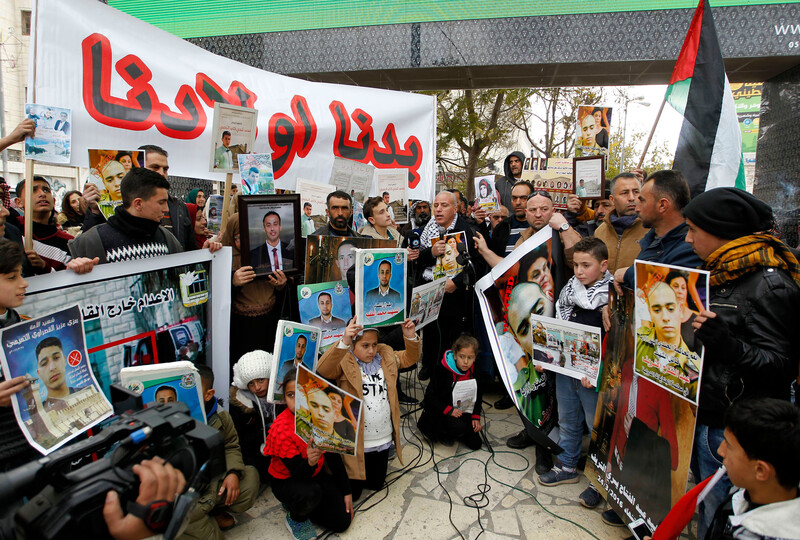
The family members of Palestinians killed during alleged attacks on Israeli forces call for the transfer of their bodies in the West Bank city of Hebron on 4 January.
APA images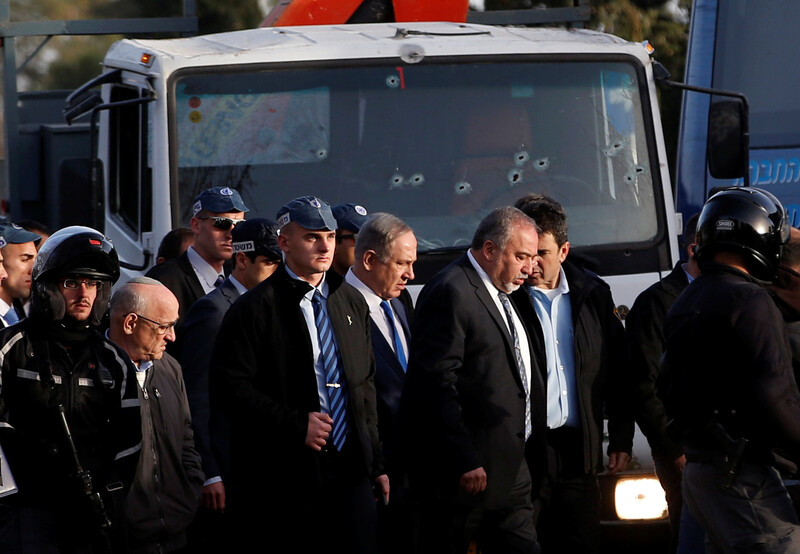
Israeli Prime Minister Benjamin Netanyahu, center, with Defense Minister Avigdor Lieberman, right, at the scene of an attack in Jerusalem on 8 January. A Palestinian driver plowed into a group of Israeli soldiers, killing four, before he was shot dead.
Reuters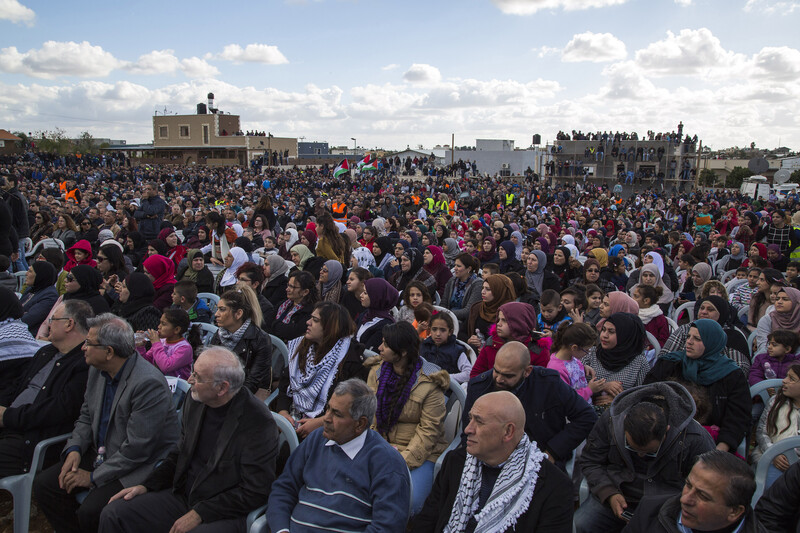
Palestinian citizens of Israel take part in a demonstration against the demolition of 11 homes by Israeli forces in the Palestinian town of Qalansawa in northern Israel, 13 January.
ActiveStills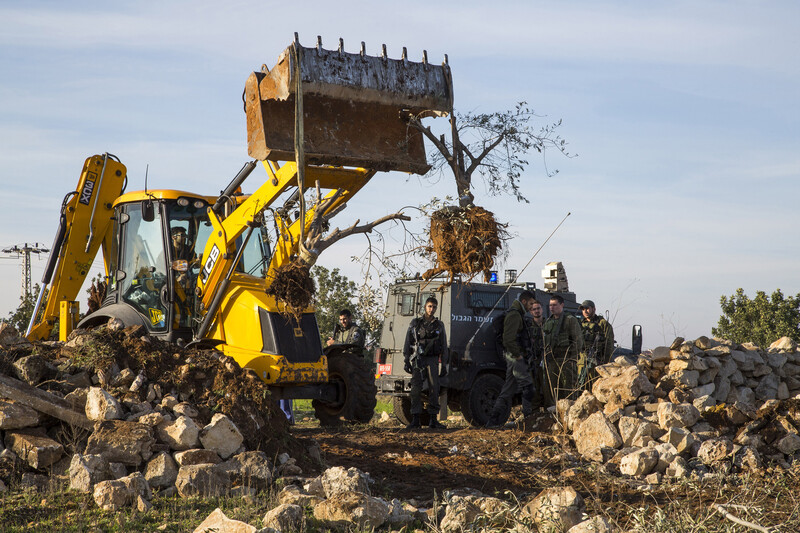
Israeli forces uproot olive trees on private Palestinian land in order to build the Nabi Elias Bypass Road for the sake of Israeli settlers in the area of the West Bank town of Qalqilya, 16 January. The Israeli army declared the area a closed military zone after the landowners, along with a number of Israeli activists, arrived in the area to protest and try to stop the uprooting. The Nabi Elias bypass road will involve the expropriation of 25 acres of Palestinian land, including a total 700 olive trees belonging to the Palestinian villages of Izbat Tabib, Azzun and Nabi Elias.
ActiveStills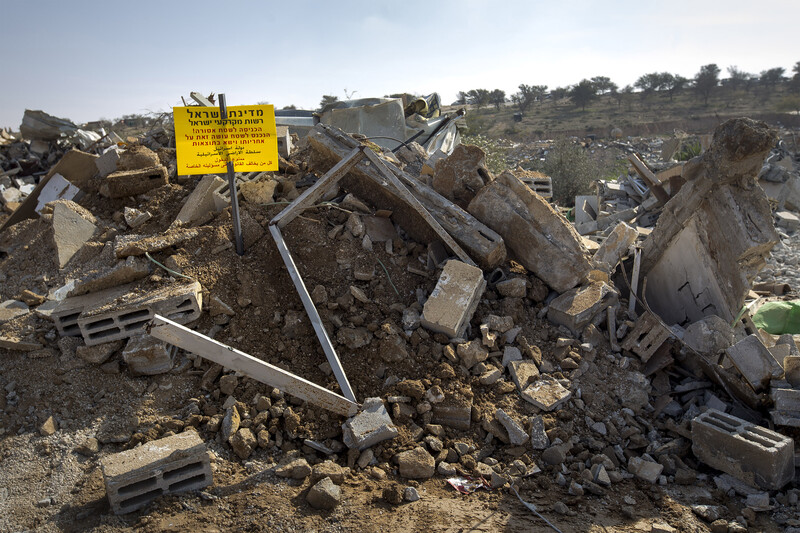
The rubble of homes destroyed by Israeli forces in the unrecognized Bedouin village of Umm Al-Hiran, in the Naqab desert in the south of Israel, 18 January. A resident of the village and an Israeli police officer were killed during the operation.
ActiveStills
A worker inspects equipment during the opening ceremony of a seawater desalination plant funded by the European Union and implemented by UNICEF in partnership with the Palestinian Authority in Deir al-Balah, central Gaza Strip, on 19 January.
APA images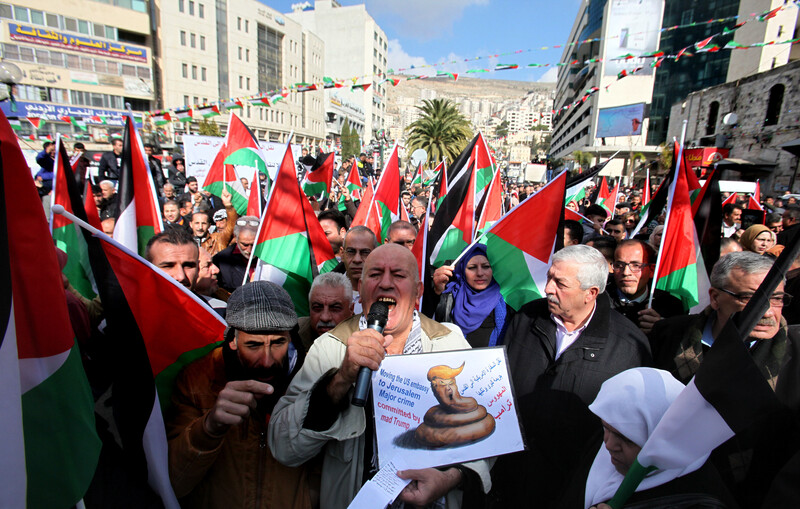
Palestinians in the West Bank city of Nablus protest a plan announced by then President-elect Donald Trump to move the US embassy in Israel from Tel Aviv to Jerusalem, 19 January.
APA images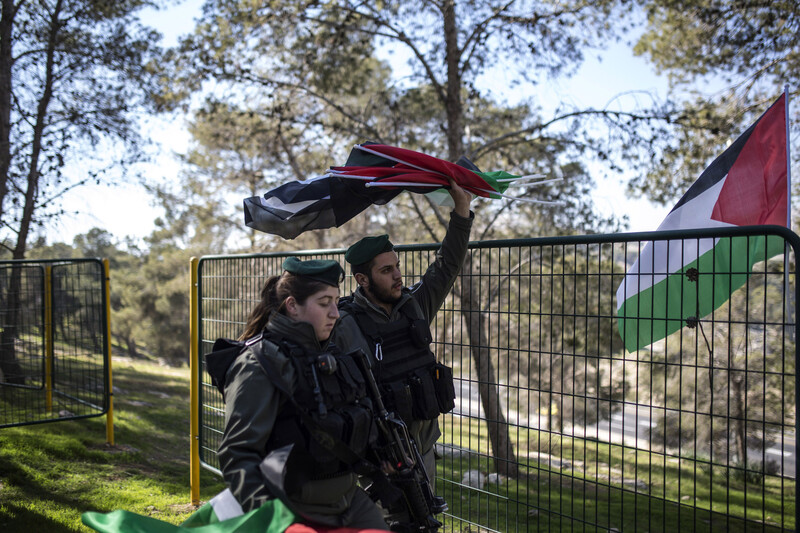
Israeli Border Police forces confiscate Palestinian flags during a protest in the Jerusalem-area village of al-Eizariya against a proposed Israeli law to annex the Maale Adumim settlement bloc to Israel, 20 January. The demonstration was also against the proposal to move the US embassy from Tel Aviv to Jerusalem.
ActiveStills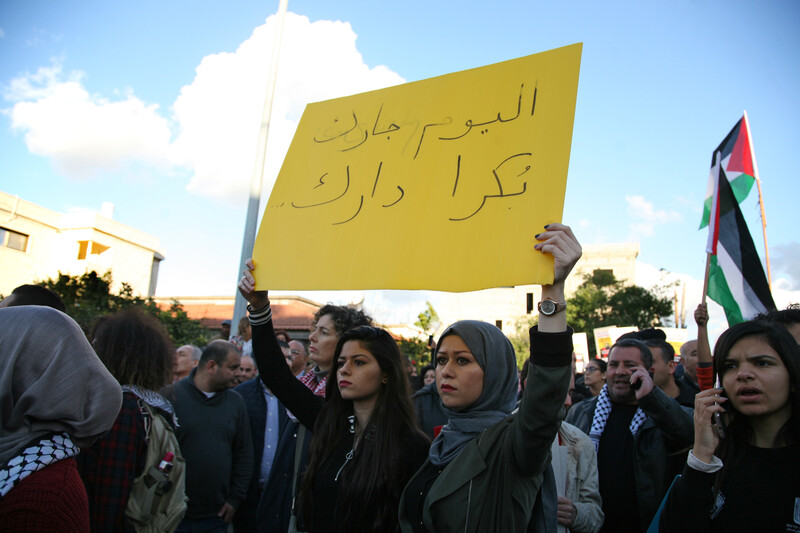
Protesters in Arara, a town in northern Israel, hold a sign reading: “Today your neighbor, tomorrow your house” during a demonstration against home demolitions in Palestinian communities in Israel, 21 January.
ActiveStills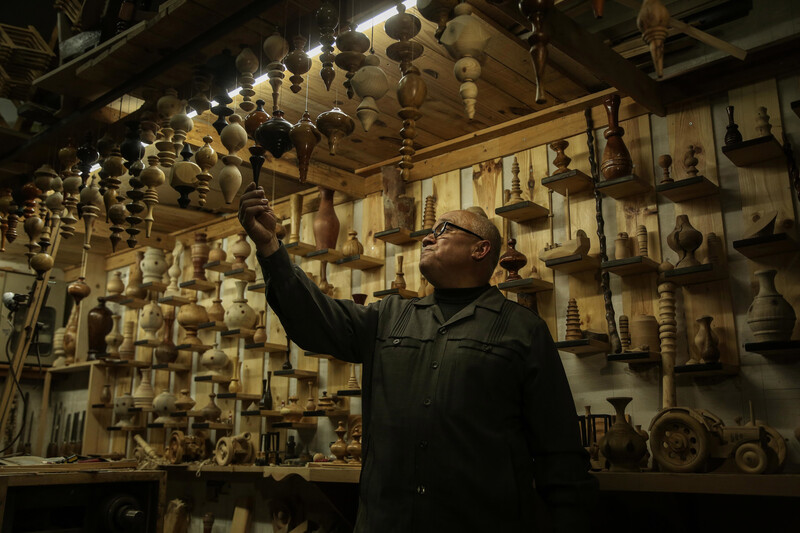
Woodworker Hisham Kuhail arranges decorative objects at his Gaza City workshop on 21 January.
APA images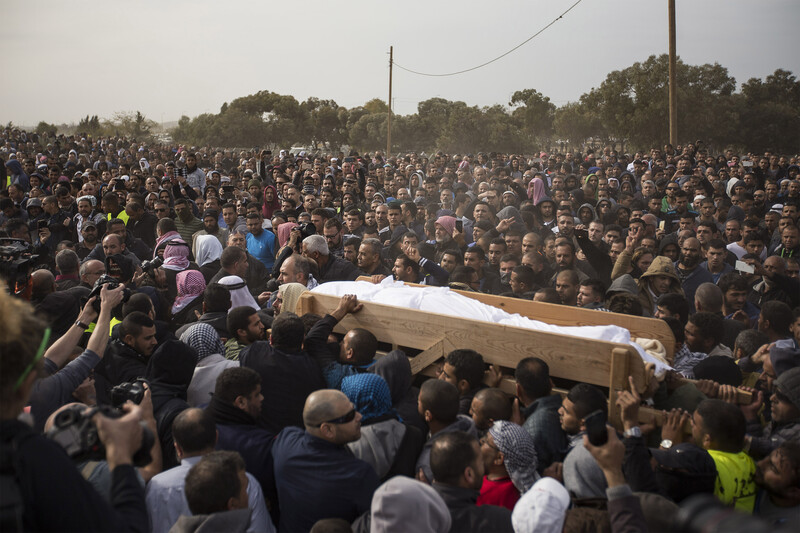
Mourners carry the body of Yaqoub Abu al-Qiyan during his funeral near the Bedouin town of Hura, in the Naqab desert in the south of present-day Israel, 24 January. Abu al-Qiyan was shot and killed by police during a home demolition raid on the unrecognized Bedouin village of Umm al-Hiran the previous week. His body had been withheld by Israel several days and was transferred to his family after a court order.
ActiveStills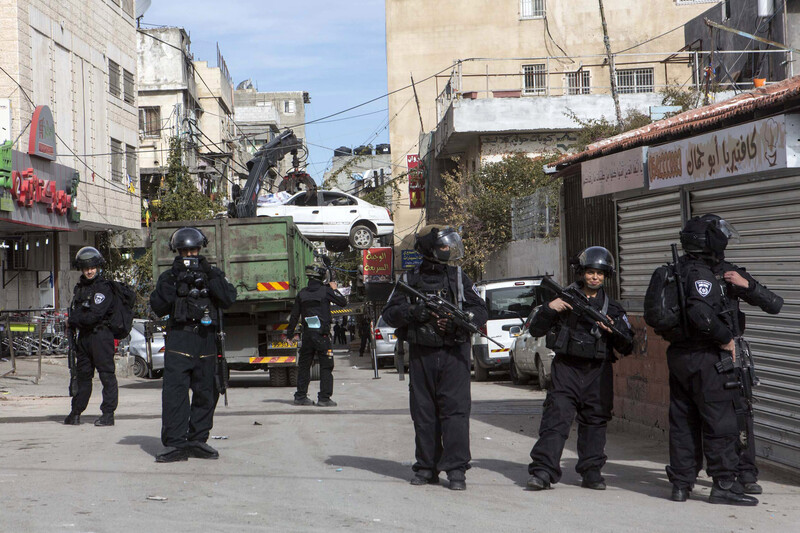
Israeli police forces block the main street of Shuafat refugee camp in occupied East Jerusalem while confiscating a car on 24 January. A large force of police entered the camp to distribute fines against cars. Shuafat refugee camp is the only Palestinian refugee camp located within Israel’s municipal boundary of Jerusalem.
ActiveStills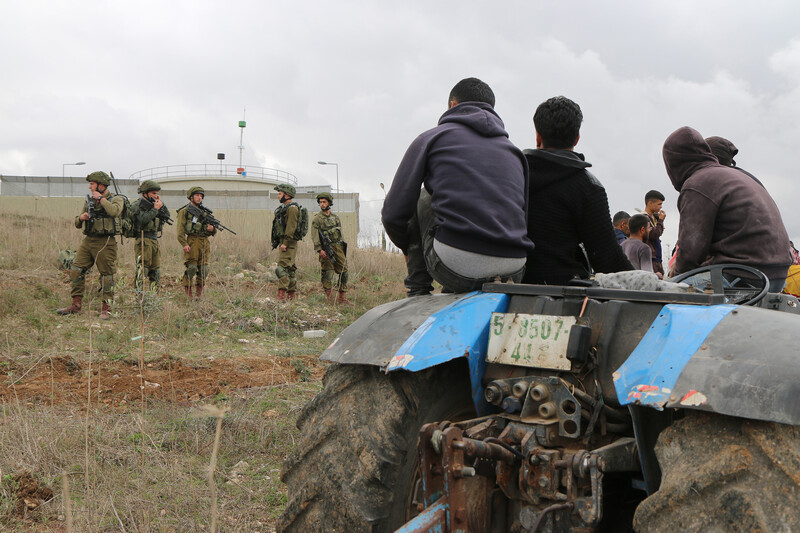
Israeli soldiers provoke Palestinian farmers and volunteers in Asira al-Qibliya village near the West Bank town of Nablus as they plant olive trees and till soil in protest of a recent Israeli military order to confiscate private Palestinian land for the nearby settlement of Yitzhar, 26 January.
ActiveStills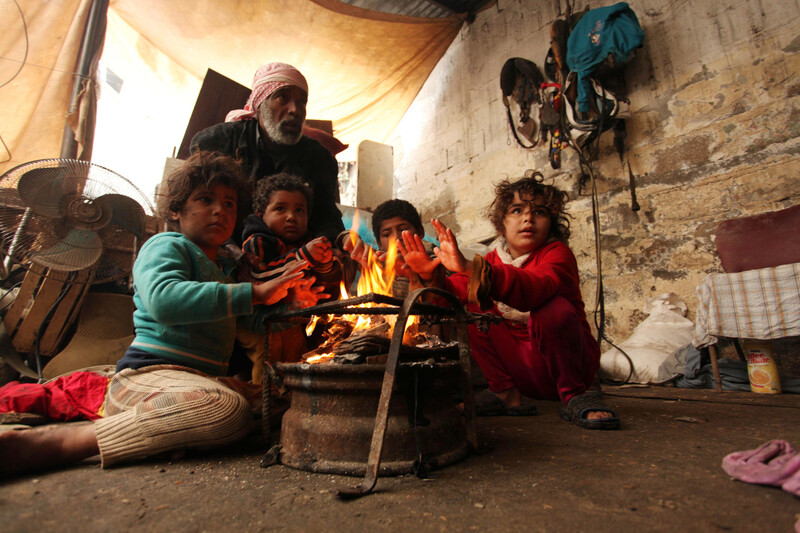
A Palestinian family warms up by a fire in a hovel during cold and rainy weather in the Jabaliya refugee camp, northern Gaza Strip, on 28 January.
APA images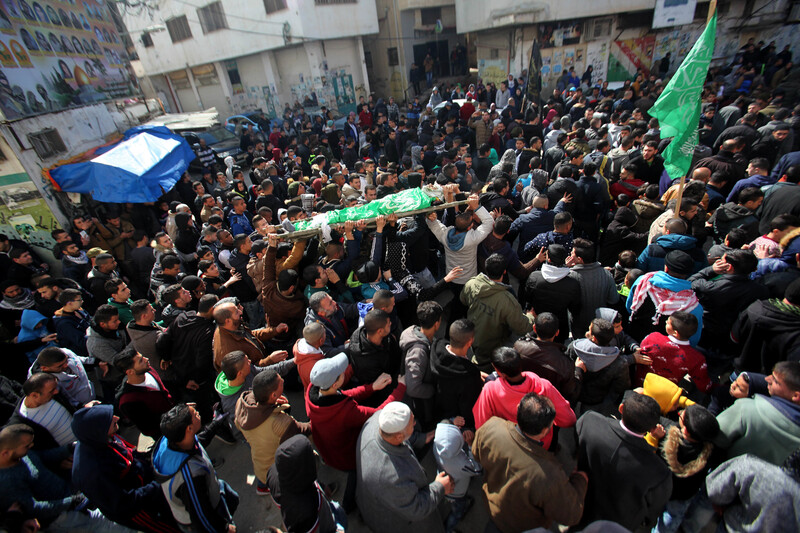
Mourners carry the body of Muhammad Abu Khalifa during his funeral at the Jenin refugee camp in the northern West Bank on 29 January. Abu Khalifa, 19, was shot dead and five others were wounded by Israeli soldiers who raided the camp earlier that day.
APA images

